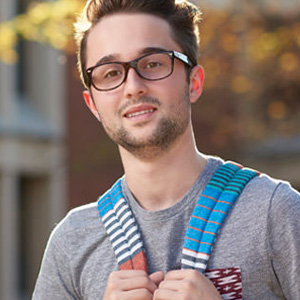Become a Laboratory Technician and Make Your Mark on Health Care
The clinical laboratory technology (CLT) associate in applied science (AAS) program provides a combination of theoretical knowledge and hands-on experience in various areas of laboratory testing, including microbiology, hematology, clinical chemistry and immunology.
STLCC is one of the longest running, continuously accredited clinical laboratory technology programs in the region. Each year, 25 students who meet the application requirements are accepted on a first-come, first-served basis. The program begins each fall semester. Coursework includes lectures and laboratory procedures. The following fall semester, students are assigned to clinical affiliates for internship and clinical practice.
This program has special admission requirements. Please review the requirements checklist before submitting your application.
What is Clinical Laboratory Technology at St. Louis Community College?
Clinical laboratory technology, also known as medical laboratory technology, involves analyzing and conducting tests on biological samples such as blood, urine and tissues. These trained professionals play a vital role assisting physicians with accurate diagnosis, monitoring disease and treatment planning.
Who Are Clinical Laboratory Technologists?
Clinical or medical laboratory technicians are key members of the health care team and serve as a vital part of the elaborate framework of modern care. Technicians are trained in laboratory techniques that help diagnose, treat, prevent diseases and maintain health.
Most technicians work in hospitals, medical and diagnostic laboratories, and physician offices. The medical or clinical laboratory technician performs qualitative, quantitative and analytic testing in microbiology, hematology, blood banking (immunohematology), clinical chemistry, immunology and urinalysis. If you enjoy science, can work well both on a team and on your own, then the CLT program has all the elements of a successful career path for you.

What Can You do with a Clinical Laboratory Technology Degree?
With a clinical laboratory technology associate degree, you can become a certified medical laboratory technician (MLT). In this role, you perform various diagnostic tests, analyze samples and assist in disease detection and monitoring, playing a crucial part in the health care team.
Graduates of this program are qualified for entry-level positions as clinical/medical laboratory technicians. Employment opportunities are widely available in hospitals, clinics, doctors’ offices, independent laboratories, public health, research and industrial laboratories. Hospitals employ 45 percent of technicians, while 22 percent of technicians work in medical and diagnostic laboratories. According to the U.S. Department of Labor, Bureau of Labor Statistics, employment of clinical laboratory technicians is expected to grow by seven percent between 2021 and 2031.
AAS Medical Laboratory Technology
- Degree offered: Associate in applied science
- Locations: Forest Park
- Hours to complete: 70
- Program contact name: Minini Numbere
- Program contact email: mnumbere@stlcc.edu
- Accreditation:
Accredited by the National Accrediting Agency for Clinical Laboratory Sciences (NAACLS)
5600 N. River Road, Suite 720
Rosemont, IL 60018
Phone: 772-714- 8880
naacls.org - This program meets the educational requirements for state licensure in Illinois. Students interested in pursuing licensure in a different state should contact the program coordinator for more information.
Tuition for district residents is $122 per credit hour for in-district students. Find out more about our straightforward and low-cost tuition structure.
Admission Requirements
- Minimum cumulative GPA of 2.5 in high school or for 15 hours (minimum) of college
work.
- Students with fewer than 15 hours of college credit must have both a 2.5 GPA in high school and a 2.5 GPA in college.
- Applicants with a high school equivalency certificate must have 15 hours of 100 level or higher college credits with a minimum 2.5 GPA.
- STLCC students with at least 15 college-level credits with at least a 2.5 GPA will have met this requirement, regardless of the GPA at other colleges.
- Transfer students with fewer than 15 STLCC credits must have a minimum cumulative 2.5 GPA in college-level credits earned.
- All students must maintain a GPA of 2.5 or higher to remain on the wait list.
NOTE: Developmental courses (numbered below 100) will not be counted toward the 15 hours of college work and will not be included in the GPA calculation for admission to the program.
- Reading: Complete ONE of the following to meet the prerequisite.
- Reading ACT score of 18 or higher OR SAT EBRW score of 500 or higher (within the last 3 years)
- Accuplacer (Next Gen) score of 250 or higher on the Reading Portion (within the last 3 years)
- Demonstrate college-level reading competency.
- English: College Composition I
- Completion of ENG 101 College Composition I with a grade of "C" or higher.
- Math: Complete ONE of the following to meet the math prerequisite.
- Completion of MTH 140 or higher with a grade of "C" or higher.
- Completion of MTH 140S or higher level math with a “C” or higher.
- Biology: BIO 111 Introduction to Biology completed with a "C" or higher within five years of applying to the program. Note: If BIO 207 Anatomy & Physiology I has been completed with a "C" or higher in the past five years, it can also be used to meet this requirement if BIO 111 has also been previously completed.
- Chemistry: CHM 101 Fundamentals of Chemistry I or CHM 105 General Chemistry I completed with a "C" or higher within five years of applying to the program.
Clinical Laboratory Technology Program Requirements Checklist
Essential Functions
Students in the clinical laboratory technology program must meet the essential requirements, which are the non-academic standards that a student must master. Examples of this program's essential functions:
Standard: |
Examples of necessary skills: |
|
Observation and sensory skills sufficient to observe and perform laboratory procedures |
|
| Physical abilities sufficient to maneuver as required to perform laboratory procedures |
|
| Communication abilities sufficient for interaction with others |
|
| Intellectual ability and critical thinking skills sufficient for clinical judgment and professional behavior |
|
| Ability to behave and respond professionally to various situations to ensure your own safety and that of others |
|
Program Outcomes
Graduate certification rates demonstrating an average of at least 75% pass rate.
Graduation rates demonstrating an average of at least 70% of students who have begun the final half of the program go on to successfully graduate.
Job placement rates demonstrating that an average of at least 70% of respondent graduates either find employment in the field or a closely related field, or continue their education.
Why You Should Choose STLCC's Medical Lab Tech Program

Graduate with Little or No Debt
We believe cost should never be a barrier to achieving your potential. Save over $4,700 per year with tuition that's one-third lower than other local institutions.

Ramp Up High Wage Skills
STLCC offers career-focused programs for high-wage, high-skill and in-demand jobs. STLCC provides opportunities for college transfers, career development and workforce training.

Caring for Students
STLCC goes beyond academics with support services, ranging from stress and anxiety management to grants for childcare, emergency crisis support, clothing and free meals through Archers' Market and Brown Bag Cafe food pantry. We offer free tutoring on campus or online, plus access to Tutor.com.

Helping Students Overcome Barriers
STLCC partners with the U.S. Department of Education to offer TRIO, supporting first generation and other students from disadvantaged backgrounds. TRIO helps students earn more credits, obtain a higher GPA, gain valuable skills and build a stronger community.
STLCC. What's your reason?